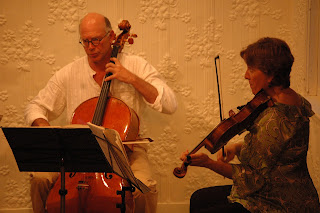 |
| An annotated tax map of downtown Stonington, ME. The pink dots represent properties owned by non-residents. |
In 2020, the COVID-19 pandemic accelerated and exacerbated a trend that was already well underway: the sale of our communities to investors and "non-residents" -- people who do not work here, vote here, or live here year round.
The map above shows the impact on the village of Stonington. Only 30% of our downtown properties are owned by residents. And only 15% are commercial enterprises.
That means 55% of downtown properties are owned by non-residents. And outside of the village, 80%+ of the total Stonington shoreline is the same.
Some call this gentrification: when wealthier people from other areas, in search of a higher quality of life, gravitate toward beautiful, end-of-the-world places formerly populated by people there because of birth or work -- including artists. Because property values and incomes are higher where they originate, their interest in and purchase of local properties in communities such as Stonington drive real estate values beyond the reach of local workers.
Change is inevitable and those who engage with the same place year after year know the glories and the heartaches of these changes. The questions are: can we direct and influence change with community values and actions? Knowing what history has taught us: how could we do this differently? How might incoming property owners show more respect for preserving the cultures and places where they want to spend time, too?
Because in some ways, we might also consider some of these changes as a kind of ongoing colonization. After all, the generational White islanders who make up a majority of today's Deer Isle residents replaced the indigenous people who stewarded and used the natural resources for more than 2,000 years before we asserted our own White European cultures.
Here's a suggested, partial checklist of "community rules" for everyone's consideration -- feel free to add to and share this!
Get to know a place and its people and economies before purchasing property. Buying property in bidding wars "sight unseen" on the internet is no different from being part of a gold rush. And just like previous gold rushes, it's destructive to a place's natural and cultural resources.
Our community is more than your financial investment. We live here year round, through the cold and muddy grind climbing March hill. We raise children here and struggle to maintain our local schools. We work here and what we harvest and make creates a sustainable year-round community. We vote and volunteer as firefighters and ambulance drivers; we serve on committees and participate in the municipal process, moving the gears to make a livable, sustainable place that can welcome visitors such as you.
Don't put your own desires above the community's needs. I know this is a tough one given American individualism, but...well...it's not all about you and what you can afford and to what you feel entitled because you happen to have the cash -- or the real estate to attract the cash. Feel blessed by and grateful for your privilege. We didn't allow our "rusticators" of the past to gobble up all the real estate so that workers had no places to live, and they in turn didn't rent their seasonal cottages to others to churn in and out of every three days as if this is a party boat. Love Deer Isle-Stonington? Buy a non-winterized cottage and spend five months here, volunteering for nonprofits while you are here. Or establish a regular rental from a year-round person who needs the income to pay their property taxes. Already doing these things: thank you! Remember that you already own a place and vote and work somewhere else: you don't need to own here, too.
Be of service, make a positive impact. If you've made it through the first three bullet points and are still determined to buy, sell, or rent a place, consider how you can contribute -- with your time, expertise and heart, in addition to your wallet -- where the community has the greatest need. Some communities add transfer fees to real estate sales to fund needed community projects. Or if you buy and are only going to visit for two weeks of the year, consider renting it for the other 50 weeks to a year-round, working community member. It's not as sexy or as flush with cash as being an AirBNB host, but it will eventually help you to become an actual member of a real and beloved working community.
In the meantime, the Stonington Economic and Community Development Committee is running a Short-Term Rentals Task Force with the objective of lessening the negative impacts some of these are having on our communities. We meet monthly and welcome your input to econdev@stoningtonmaine.org.
Our island is suffering from the top-heavy impact of a new wave of colonizers. Our workers have no places to live and are cut off from the source of their labor and passion on our working waterfront. Our natural resources and infrastructure -- such as Stonington's Sanitary and Water districts -- are stretched beyond their capacity. Our schools don't have enough students to be sustainable, and our teachers and nurses can't find housing. Our beautiful village is dark and empty for great swaths of the year.
What can we do differently?









